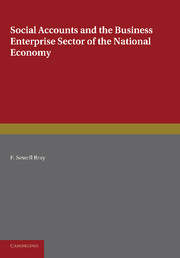Book contents
- Frontmatter
- Contents
- PREFACE
- I The double-entry system and its purpose
- II The originating structure of accounts
- III The originating reconciliations
- IV The primary reconciliations
- V The opening and closing circulating capital funds
- VI The balancing statement
- VII The system of accounts
- VIII An explanation of the items in the system of accounts
- IX The sector balance sheets
- X Glossary of terms
- Appendix I A further note on provisions for depreciation and obsolescence
- Appendix II A further note on inventories
- Appendix III Social accounting. Suggested form of business enterprise primary accounting return
- Frontmatter
- Contents
- PREFACE
- I The double-entry system and its purpose
- II The originating structure of accounts
- III The originating reconciliations
- IV The primary reconciliations
- V The opening and closing circulating capital funds
- VI The balancing statement
- VII The system of accounts
- VIII An explanation of the items in the system of accounts
- IX The sector balance sheets
- X Glossary of terms
- Appendix I A further note on provisions for depreciation and obsolescence
- Appendix II A further note on inventories
- Appendix III Social accounting. Suggested form of business enterprise primary accounting return
Summary
Accrued expenses. An amount, usually calculated on a time basis, intended to cover services rendered but not paid for at accounting dates.
Appropriation account. The working account of an enterprise which portrays the amount of available income from all sources applicable to a relevant accounting period, that part of it which is distributed by way of dividends to and withdrawals of proprietors, and that part which is reserved as business saving.
Balancing statement. A summarised list of classified entries in debit and credit columnar form designed to show that all the items entering into a system of accounts are in a state of balance. In accounting terminology this statement is called a ‘Trial Balance’.
Capital. In general terms the amount of money contributed to an enterprise by its proprietors to finance the acquisition of fixed and circulating assets.
Circulating capital. The net working resources of an enterprise equivalent to the amount of its current assets minus its short-term liabilities, both currently due for payment and accrued, at accounting dates. These resources are commonly described by accountants as working capital.
Creditor. In this context a monetary liability for goods delivered and services rendered but not paid for at a particular accounting date.
Current assets. Those assets of an enterprise which are normally held for realisation in the ordinary course of business, e.g. inventories, debtors, bank balances and cash. (See The Recommendations on Accounting Principles of the Institute of Chartered Accountants, p. 22.)
Debtor. In this context an amount of money owing to an enterprise at a particular accounting date for goods delivered and services rendered.
Deferred charge. A payment for a service which is not incurred in connection with current output but for the future benefit of an enterprise.
Depreciation and Obsolescence. In this context an amount provided out of the operating receivables of an enterprise to build up a fund which will conserve circulating resources sufficient to enable equipment to be replaced by the time it is worn out or obsolete.
- Type
- Chapter
- Information
- Publisher: Cambridge University PressPrint publication year: 2013



